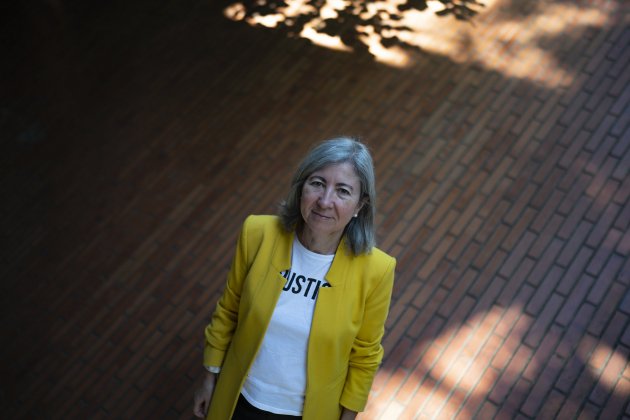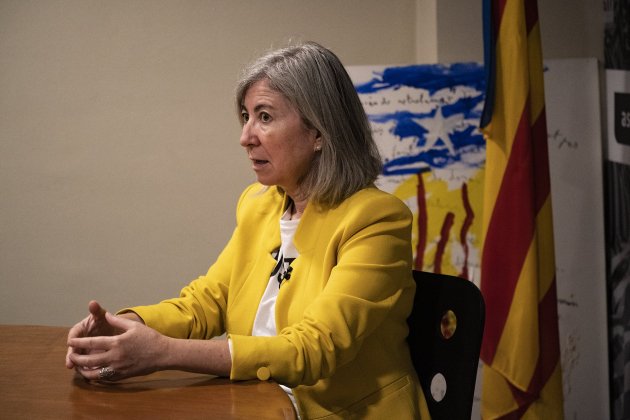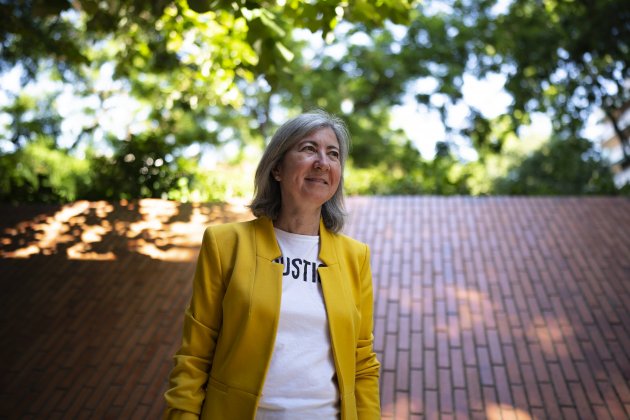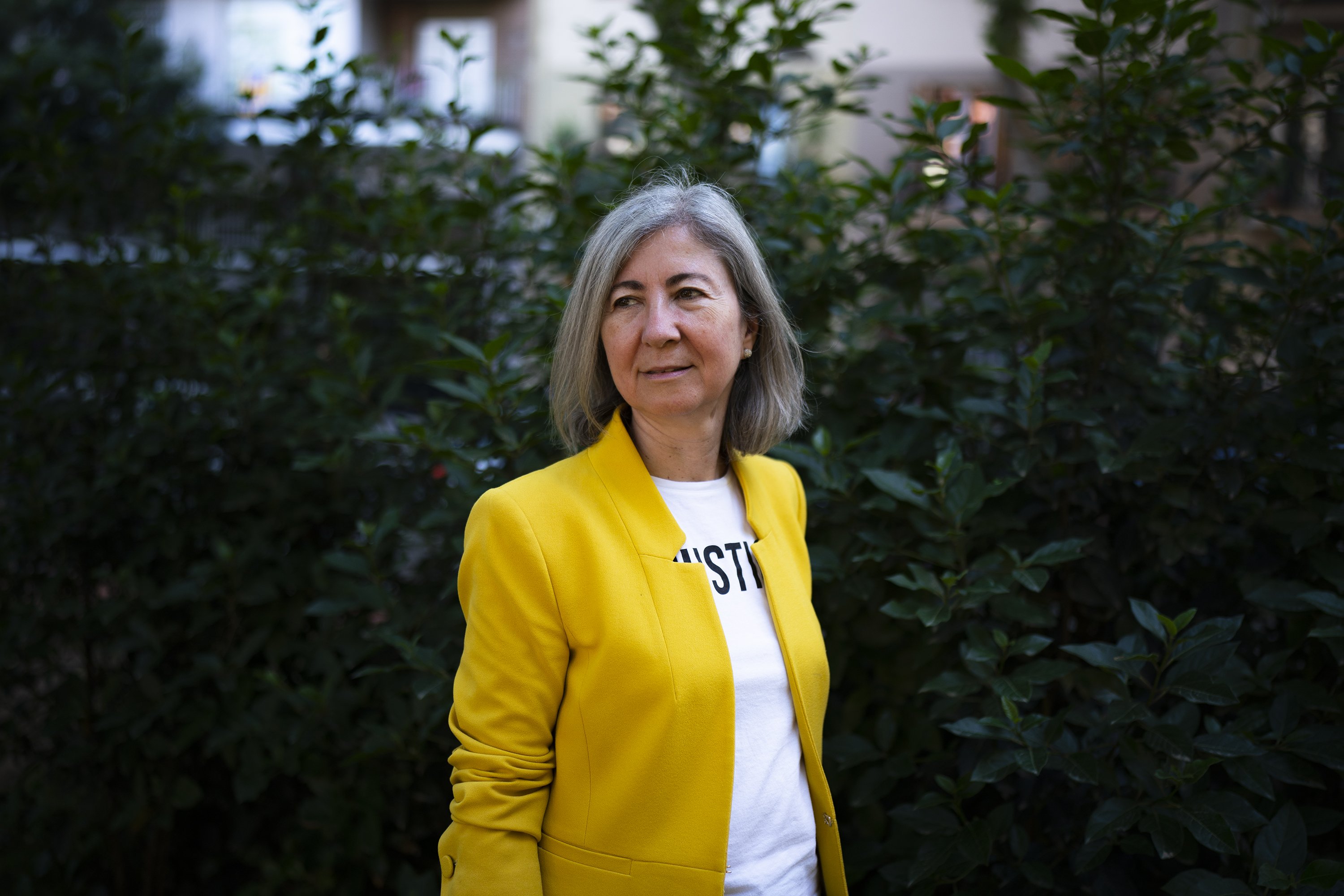The end of Elisenda Paluzie's period at the head of the Catalan National Assembly (ANC) in the month of May has meant the start of a new era for the pro-independence organization. Now it's the turn of Dolors Feliu. Activist and lawyer, she has had a long career linked to the sovereignty movement, as a member of the parties Convergència Democràtica de Catalunya and PDeCAT between 2008 and 2018, and having stood on the pro-independence unitary list Junts pel Sí in the 2015 elections. In addition to that is her activism in the Assembly itself for years and in the exile body Council for the Republic, which she ended up leaving just a few weeks ago to prioritize the campaign to replace Paluzie. However, Feliu now faces two difficult years in office. Apart from the demobilization of the independence movement and the Catalan general public, there is a government whose strategy is far removed from confrontation with the state and which blindly advocates negotiation, despite the emergence of the Catalangate scandal and a dialogue table that has failed to bear fruit. The future of the civil society association will also be shaped by its own recently-approved roadmap, which aims to strengthen its alliance with the Council for the Republic and promote a civic candidacy in the next parliamentary elections in order to culminate independence. A responsibility that will fall into the hands of Dolors Feliu if she is re-elected to lead the Assembly again in two years. That will not be easy: in this year's elections she finished in second place, behind Jordi Pesarrodona, and needed the support of the national secretariat in order to reach the presidency. Despite this struggle, however, there is no tension between the two leading names. In fact, Feliu and Pesarrodona together receive the ElNacional.cat team at the ANC offices, showing a good rapport and an attitude of unity towards the challenges of the present and the future.

Dolors Feliu - Photo: Joan Mateu Parra
In the Catalan National Assembly elections, Jordi Pesarrodona won the vote among the membership. This is the third time that the most voted candidate has not reached the presidency.
Keep in mind that members vote for a lot of people. Each person casts eight votes for the people they want to enter the national secretariat. Not everyone who votes for you wants you to be president. Sometimes, not voting very much can cause certain tensions. But if you are an ANC voter, as I have been for ten years, you know perfectly well how to vote and what the meaning of the vote is, and the meaning of the vote is that you choose the national secretariat. Having a lot of votes from people shows the secretariat that a given person has a lot of support, but in reality they are the ones who choose the four organic positions presented to them (presidency, vice presidency, treasury and secretary). The votes mean that many people want you to be on the national secretariat, but it is that secretariat that chooses the president.
The state gives us reasons, but we are the ones who have to take note and react
And the vice presidency will be shared for the first time. Is that a sign of a lack of unity among members of the Assembly?
Sometimes democracy is not unity. Having a plurality of people running for office with different profiles is a strength of the organization. It is a asset that must be managed without confrontation, and this is how a strong organization full of strong people is achieved. I think we have succeeded, that the discourses that have been coming out since then are from people who are going in the same direction and we have come out reinforced internally, even if sometimes there is a certain amount of media noise. We all go together and we are working hard side by side.
The Assembly has lost the confidence of the parties in recent years. How can it become a motor for pressure again?
It lost the confidence of the parties because the parties lost the confidence of the people. In recent times, no project for independence has been made, although the Assembly has kept calling for one firmly, and it has often been almost the last bastion, sometimes alone. These have been very difficult years of repression and the pandemic, and we must be grateful for the steadfastness and hard work of the members, as well as building on what they have left behind. The Assembly remains stronger than ever. I came in a few days ago as president, and whoever says activism is dead should come here with me one day and see the work we do, because a lot of people in the country are really waking up.
Turnout in the Assembly elections was low and it is difficult to mobilize them. Do people still want independence?
The Assembly interprets that people are a little tired of the repression, the pandemic and the fact that independence is not really being put on the table. It is these political parties with their lack of concretion that have weakened the hope of fighting for independence. It is necessary to work in the direction of reaffirming the will to carry it out. But in the end, it's the people who have to act. At the moment there is a feeling that the 52% pro-independence vote is being wasted, and that the Assembly will be the body which will get the impulse back. It is true that there was a poor turnout here, but by putting a clear project for independence on the table and appealing to people to react to the repression we believe it will rise. We have a Spanish state that is our ally in getting people off the sofa.
But independence has already won 52% of the vote in the last election. Isn't that enough?
It is quite obvious that it is not because [the government] is not acting in a pro-independence way. This is precisely what we put on the table: if independence is not achieved from the parties, the project will come from the Assembly, from the ranks of pro-independence activism. It will be up to us to make this project a reality.
This is linked to the Assembly's roadmap, which proposes a civic list for the 2025 elections. In an interview, you have set that as the deadline for independence.
Nor do I want to say that this is the date, I am just saying that the roadmap puts mechanisms in place to take part in electoral processes and use that vote to make independence happen. Our eyes look forward as far as the upcoming Catalan parliamentary elections at the most, because there may be an early election. We are seeing a lot of actions in Spain that put us on the ropes and in a certain way they could cause us to get onto our feet, as at other times when it happened previously: the sentences of the independence leaders trial in October 2019, and the imprisonment of the rapper Pablo Hasel last year. Those are reactions from desperate people, who see no way out. However, on Thursday in the Congress of Deputies, prime minister Pedro Sánchez said that the [2019] riots were intolerable and that for that reason they had spied on us, but in reality they were uprisings produced by the pure despair of not seeing a democratic way forward in the face of this violation of fundamental rights. These actions could provoke reactions, and even an early election, that would move the chessboard.

One of the actions that could have generated a social reaction has been the Catalangate espionage, another example of the Spanish state's repression.
And it doesn't hide it. On the one hand, they try to show that they are willing to dialogue, that they are committed to dialogue, and on the other hand, they unleash a repression that does not stop and no longer deceives anyone. We have to bring about independence because these people have historically always made it look like they are in dialogue, or they are carrying out repression, or they are doing both at the same time, as they are doing at the moment.
The Catalan Republican Left (ERC) has supported the Spanish government in the Congress of Deputies in exchange for a non-existent dialogue. Could Catalangate break up relations?
At one point, at the beginning of the legislature, it was said that there would be two years of negotiation and dialogue, and then there would be two years of decision-making. The two years are not over yet, only one has passed. The closed attitude of the Spanish state and of the Spanish government is so contrary to the direction of dialogue, given that they clearly say that they do not want to negotiate Catalan self-determination nor a referendum nor an amnesty, which I believe is very closed. I guess they think Sánchez has already done a lot, for example with the pardons. But they did this after the report of the Council of Europe in which Spain was expressly asked to release the prisoners and take decisions on the exiles, and now the judicial review of the pardons is also on the table of the Supreme Court. We can't fool ourselves. They sell it as the grand dialogue, ‘I bashed your head and locked you in jail and now I’ve pardoned you, look how good I am’, but we want independence. There is no real dialogue.
It is the parties with their lack of concretion that have weakened the hope of fighting for independence
Is this non-existent negotiation stifling the independence process?
The dialogue does not exist. If there really was a dialogue with strong actions taken and there was a moment of dialogue concluding, maybe it could be pushed. Serious things can be done with dialogue, but a dialogue in which you can't talk about a referendum and have meetings to get through the days, while at the same time it is revealed that you are being spied on, makes you despair and you protest, and then they argue, why shouldn't they spy on you... when it's like this we're not going anywhere. We could do things if we put them forward. It is not up to the Assembly to say how it should be done, nor what the leadership of the political parties should be. Let them do what they want, but it is clear that this dialogue is not going anywhere. It would be good to have a moment of completion, to make it clear that the state has said no, because now days are going by and the state is saying 'Yes I want [dialogue], let's meet'. The last time it happened to us was with the bilateral commission and the empty meteorological hut of the Turó de l'Home, which was already owned by the Catalan government, they took it during the Franco regime and now they return it empty without a weather station and as a major show of good will! All these traps show this unreasonable way of approaching the dialogue on the part of the Spanish state. And for our part, there is no much spirit that allows to be convinced, when it is more of playin a joke on us than a dialogue.
The agreement for the investiture of the Catalan government set a two-year limit on dialogue. Will it be fulfilled?
In fact, there is a reason why that two year period was set. Next year is the Spanish election, and negotiations will inevitably end because the Congress will be renewed. What is the danger? That they win again and continue like this with an endless dialogue that is really 'Either you do what I want or repression', and in the meantime they make out that they do want it, when in fact it is not so. Like the time that prime minister Sánchez boasted that he had managed to make it possible for the Spanish football team to come here easily to play football. I would suggest to him that king Felipe VI should also come here easily. It's a medal they award themselves: they consider their negotiation a success because La Roja team can come and play. We can't accept this situation. I tell it to people and my spirit drops to the floor. We have to end it somehow and it must be clear that dialogue must be serious dialogue and that if it does not work, we will go in the direction of another project.
And if the right wins those elections, necessarily the strategy of dialogue with the state will have to change.
There are people who say that 'The worse things get, the better for us.' I do not want to fall into this trap, because the worst can be much worse, but it is true that right now we are not going anywhere as we are. It is also worth noting that this is not so much about the state as it is about us. The state gives us reasons [to act] in a very transparent way and they put us in front of a mirror, but we are the ones who have to take note and react. It depends more on us than on them, honestly.
While ERC is committed to dialogue, Junts, the CUP and the Assembly are committed to a more groundbreaking path. What should the Assembly's role be in abandoning negotiations with the state?
The Assembly takes action in relation to the whole population, with regard to voters. People vote for their parties, and vote for who they want to. If you are a pro-independence activist, you want to bring that independence about and the scholars of civil disobedience say that the vote of any activist is tied to their activism. Activism is to achieve the independence of Catalonia and, if people are confident that the votes they decide on will go to a place where a project for independence is really being carried out, they will really be there. If not, obviously not. But that does not depend on the Assembly. We carry out a project for independence. If the parties do not mount a project for independence, there is disillusionment and 52% is wasted. That is why in our roadmap there are actions for the electoral moments that the Assembly already has planned.
Is there room for this civic list?
At the moment, the feeling that many people convey to us and that seems to be a common element of many activists is that they are disillusioned with the use being made of their pro-independence vote, and think that the space occupied by these parties with their pro-independence vote is not being taken advantage of for the purpose that the voters gave their votes to them. Yes, it is clear that there is a space that these parties are abandoning, which is the space to actually do and not just talk about a project for independence. And this is where this civic list would make sense. In the pro-independence world we have been working for ten years with people who have been very committed, who have not been linked to parties and who already feed into a large part of the population. There are a large number of Catalans who really are activists, who have not joined any party and who are well-known people who have been activists from day one, working in the Assembly from the front line. It is these people who could make possible what we say: a list of such people with a little more spirit and clarity about the project to carry out independence.
Could a civic candidacy be the key element to culminating independence?
This is the idea, that it is one of the ways out, because we need ways out.


